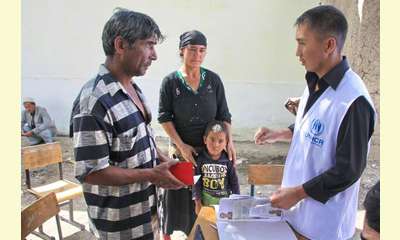|
|
UNHCR project helps ethnic minority in Fergana Valley get Kyrgyz nationality
un articulo por Ainagul Abdrakhmanova for United Nations Refugee Agency (abridged)
The minority Lyuli people have been living in Jany-Kyshtak and other villages of the fertile Fergana Valley for more than 200 years. Many grew up under Soviet rule, when the Fergana straddled the Soviet republics of Uzbekistan, Tajikistan and Kyrgyzstan, and nationality was not a major consideration.

A Lyuli family discuss their case with a UNHCR staff member. Copyright UNHNCR/V.Ushakov
click on photo to enlarge
Up to half of the 3,700 inhabitants – all ethnic Lyuli – of the village in western Kyrgyzstan never obtained personal identity documents, but in recent years they have found that lack of such documents, including birth certificates, can restrict their access to many basic human rights in independent Kyrgyzstan.
The UN refugee agency is trying to help the Lyuli regain an identity as part of a wider project to assist thousands of people in the country whose nationality is undetermined. They are at risk of statelessness because they are completely undocumented, which means they face particular difficulties establishing that they qualify for Kyrgyz nationality.
Koria Urmanova, who was born in 1977 when Kyrgyzstan was part of the Soviet Union, has never had a passport or other documentary proof of nationality. "My parents died when I was a young child. When the time came to get a passport [at age 16], I did not know where my birth certificate was, so I did not get the passport," she explained.
In time she got married and over the years gave birth at home to six children, none of whom were registered at birth. At first, this was not a major problem, even after the disintegration of the Soviet Union in 1991. As her children grew older, she realized that lack of documentation could hinder their and her access to basic rights, including education, health care, employment, social allowances and more.
But with the help of UNHCR, its local partner and the government, Koria and many of her neighbours have been able to obtain documents that are vital if they are to live a normal life in Kyrgyzstan, which became independent in 1991. "Thanks to this UNHCR project, my eldest son, who has just turned 12, received his birth certificate," said Koria, who was discussing how to get a passport with visiting lawyers from the NGO, Fergana Valley Lawyers without Borders. "I hope that all my children and myself will eventually get proper identity documents," she added.
The visit of the legal team attracted a lot of interest here, with many questions about how to obtain identity documents and access to all of citizen's entitlements. Some of the older generation only hold invalid Soviet passports as identification and wanted to find out if they could trade these in for Kyrgyz passports to ensure access to government services.
The six-month project in Jany-Kyshtak village represents just a small fraction of UNHCR's efforts in Kyrgyzstan to help more than 20,000 people of all ethnic groups, including Uzbeks and Tajiks, gain proper identity documents and prevent statelessness. In the first nine months of this year, more than 9,360 people handed in their expired Soviet passports and were given Kyrgyz ones. . .
[Note: Thank you to the Good News Agency for pointing out this article to CPNN.]
|








|
DISCUSSION
No hay pregunta ligada a este article.
* * * * *
Comentario más reciente:
:

|
|









